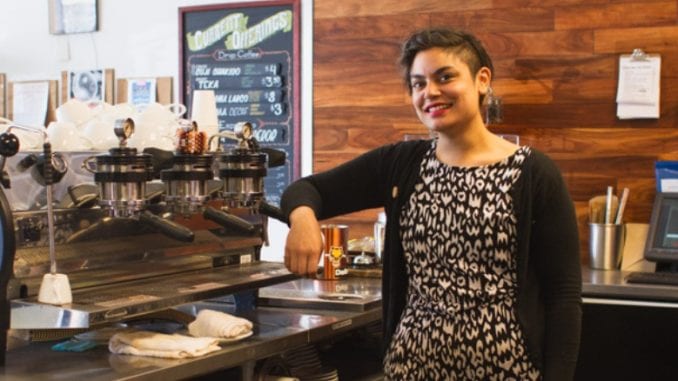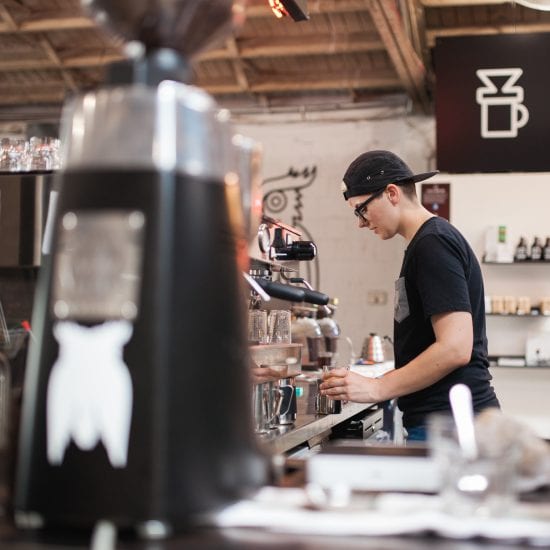
How to make your cafes more inclusive by learning gender-neutral speech.
BY RJ JOSEPH
SPECIAL TO BARISTA MAGAZINE
Cover photo by Bean Kaloni Tupou, a barista at Ritual Coffee Roasters in San Francisco who uses they/them pronouns.
The language of gender is woven so deeply into the service industry that you might not even notice it at all. Terms of respect and endearment are gendered, the words you use to describe a customer are gendered, and of course the pronouns you choose to assign to someone are gendered. As an inclusive industry, we need to find a way to move past this language. Often, when people think of progressing past discrimination, they think of changing hearts, minds, and opinions; in this case, we actually just need to correct a few simple quirks of the English language as it’s colloquially employed in cafe spaces.

Why Stop Gendering People?
Coffee as a field—both in the U.S. and abroad—is diverse. As an industry, we employ people of all genders, and as workers or owners of cafes, we welcome customers of all genders. We need a diverse array of human experience to bring the skills and knowledge our global industry requires to thrive, and a diverse array of humans who appreciate that mission to bring the money and interest that fund our jobs from the ground up. Once we acknowledge that, we can move forward with the intention of making sure people of all genders are treated with respect in coffee spaces.
The reason to stop gendering people is that when you habitually gender everyone, you will eventually misgender someone. Misgendering hurts, largely because it is so unnecessary and could be avoided with a little more education. Not everyone fits into the binary words people are accustomed to communicating within, and not everyone who does fit into the binary might look like people expect.
The solution is that instead of trying to guess everyone’s gender and sometimes getting it wrong, we can replace gendered language with gender-neutral language. That way, with a little work, everyone wins.

What Does Gendered Language Look Like?
Gendered terms of respect and endearment
Gendered terms of respect include sir, ma’am, miss, and madame. Gendered terms of endearment include dude, man, bro/brother, girl, and lady. We can gender-neutralize these by using friend, bud, and singular y’all. We don’t have a gender-neutral term of respect equivalent to sir or ma’am, but honestly, we don’t need one. Sir and ma’am come from a standard of rigid, gendered politeness that is out-of-date and now viewed by many as outright impolite. Treat customers with courtesy, and they definitely won’t miss being called sir. Broaden the scope of your service style, feel free to play around with any other good non-gendered terms that appeal to you, and enjoy the fact that anyone can enjoy being your customer.
Group addresses
A gendered group address will usually be ‘hey guys’ or ‘hey ladies.’ Since our society has always been captivated to a standard of men’s experience as neutral and women’s experiences as other, ‘hey guys’ has often been used as a gender-neutral address, whereas ‘hey ladies’ is usually used specifically for a group that appears to be all women. These are problematic not only because they will involve accidental misgendering, but also because using masculine language as gender-neutral centers neutral experiences around maleness. In our coffee spaces, I know we can do better.
Some excellent gender-neutral addresses to swap include y’all, friends, folks, people, and everybody. Use these instead of gendered group addresses and have a great time coming up with new ones.

Gendered descriptors
When we talk to a coworker about a customer, we have a tendency to describe them by gender. But since we have no real way of knowing their gender, we don’t want to do that.
Substitute gender-based descriptors like ‘that women over there with blond hair’ for gender-neutral ones like ‘that blond person in the green skirt.’ Also use the neutral words spouse or partner when casually referring to a customer’s spouse, rather than girlfriend, boyfriend, husband, or wife.
These small adjustments will help you not only to not misgender people out loud, but to actually neutralize gendered language in your mind before it even comes out of your mouth.
Pronouns
You can usually avoid talking about people in the third person in front of them, but it might happen at some point. In that case, simply use ‘they’ as your pronoun of choice for all people. It’s as simple as that. Some people use they as a pronoun, but it also exists as a neutral place-filler pronoun, which is the polite pronoun to use for anyone who hasn’t shared their preference yet.
Misgendering happens
Sometimes, despite our best efforts, we misgender people. If that happens and you get corrected, please just apologize and move on. Don’t try to justify it or over-apologize, and as much as you can, try not to feel too bad. Just give a simple apology and move on.

Take it Further
It’s important to note that these tips also apply to employees both new and old. When you meet a new coworker, don’t assume that they are cisgender and use binary pronouns; don’t refer to them using gendered language until you know for sure how they identify. Ideally, over time your company will build out infrastructure that makes all of these things a simple part of onboarding.
Creating more inclusive spaces in coffee can be as simple as editing the language we use to communicate our positive intentions with customers. Take these tips, incorporate them, think about them, and notice things on your own. Build them into your training program and watch your cafe spaces thrive.
 ABOUT THE AUTHOR
ABOUT THE AUTHOR
RJ Joseph is a genderqueer femme who roasts coffee for Counter Culture Coffee. She writes a blog called Queer Cup where she promotes structural solutions to queer inclusivity with a focus on the doable. In her free time you’ll find her listening to records and foraging in Oakland with her partner-in-coffee, Ellan.


This is so lovely! Also I’m quite sure queers are born with the difference between a flat white and a cappuccino coded in their DNA and are onto *more advanced* topics. NEXT!
@keith gatling
The article states that “being misgendered hurts”. Why hurt someone in lieu of being respectful? The elephant in the room is that trans and non-binary people deserve respect and that others don’t care. Why not just avoid using gendered language for that population?
People like honorifics. I do not rhink that it’s exclusively a POC perspective. Maybe it is a touch outdated but it is still Expected. If you could have given me a gender neutral Sir/Ma’am/Madam I would utilize it. But to tell me those “don’t matter” maybe speaks of very different customer service experiences.
like, i get it, but really?
can we just focus on what the difference is between a flat white and a cappuccino?
@Caroline Brown, I agree, if RJ uses “they/them” pronouns it’s pretty ironic that they would be misgendered as the author to an article about not misgendering. Some genderqueer folk use binary pronouns though.
Directed at Corline Brown: IF RJ IDENTIFIES as a femme and the person writing the “About the author” knows this, then it is entirely appropriate to use gender-specific wording. They probably wrote it themselves, anyways.
This is too strange, given the article above:
“ABOUT THE AUTHOR
RJ Joseph is a genderqueer ‘femme’ [maybe PERSON]who roasts coffee for Counter Culture Coffee. ‘She’ [maybe RJ] writes a blog called Queer Cup where ‘she promotes’ [maybe THEY PROMOTE] structural solutions to queer inclusivity with a focus on the doable. In ‘her’ [maybe RJ’s] free time you’ll find ‘her’ [maybe THEM] listening to records and foraging in Oakland with ‘her'[maybe THEIR or maybe just omitted] partner-in-coffee, Ellan.
My two cents worth……IF you are serious about the article
As an African-American, another marginalized group, I’ll tell you that many of us fought for years to be called sir and ma’am, and will not easily give it up just because everyone wants to seem to be your best friend, or 0.6% of the population is uncomfortable with it.
When a white person refers to me as sir or a black woman as ma’am, I’m like “Damn straight! You people finally caught on!” It also tells me that the white person I’m talking to isn’t a redneck bigot.
Look, we’re way too focused on NEVER getting anything wrong. NEVER using the wrong holiday greeting. NEVER using the wrong pronoun. NEVER handing a right-handed guitar to a left-handed person. There are statistical realities that are not biases, but are simply the way things are, and to not talk clearly and plainly about the elephant in the room because you’re afraid of offending the person who is uncomfortable with elephants is ridiculous.
We’re all outliers in some way. We’re all atypical in some way. I say own the fact that you’re atypical, rather than trying to get everyone else to pretend that you are.
LIke what you doing here but I’m here to tell y’all that bud is not gender neutral